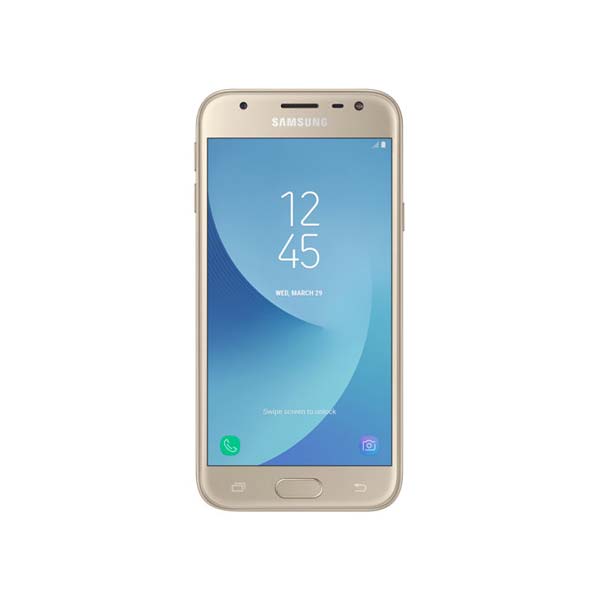
 In stock
20,500
In stock
20,500
 Out of stock
Deactivated
Out of stock
Deactivated
Samsung Galaxy J3 2017 is the latest addition to the Samsung Galaxy J series. J3 is the most affordable phone in this series after the Galaxy J5 2017 and J7 2017. The J3 2017 is the phone for those who want a Samsung phone and do not want to spend a lot of money. You can also check out the mobile prices in Pakistan for all series of Samsung smartphones.
You might also want to check:
The Galaxy J3 2017 has a unibody design. The phone feels premium in hand and is very easy to use with a single hand. The power button is present on the right side with the volume rocker on the left just like the J5 and J7 2017. All of these buttons are easily accessible.The unibody design makes the battery non-removable. The phone comes in 4 beautiful color options including blue, white, gold and black.
Samsung J3 2017 comes with a 13 MP, f/1.9 camera with autofocus and a LED flash. The image quality of the camera is above average. It takes amazing photos in broad daylight. The night time performance is also good. The primary camera can record 1080p@30fps videos and video quality is also amazing.
The front of the Galaxy J3 2017 has a 5 MP, f/2.2 camera which is satisfactory. However, the Samsung post processing software makes the images look better after you capture them. The camera also supports face detection, panorama, and HDR.
Samsung Galaxy J3 2017 comes with Exynos 7570 Quad chipset with Quad-core 1.4 GHz Cortex-A53 CPU and Mali-T830MP2 GPU. It features 2 gigs of RAM which handles light to normal multi tasking easily. However, the 2 GB RAM falls short when you try to open a lot of apps without clearing the memory. The gaming performance on this device is amazing. Almost all the games, including the most graphic demanding ones, run smoothly on it. However, you should clear the background apps before starting a heavy game to ensure smooth performance.
| Device Type | Smartphone |
| Model | Samsung Galaxy J3 2017 |
| Announced | 01 June, 2017 |
| Released | 01 August, 2017 |
| Status | Available |
| Price | 20,500 PKR |
| Type Design Type called form factor refers to a mobile phone's size, shape, and style as well as the layout and position of major components of phone. There are three major form factors seen in mobile phones => bar phones, folding phones and sliding phones. | Bar |
| Dimensions | 143.2 x 70.3 x 7.9 mm |
| Weight | 148 g |
| Colors |
White, Black, Gold |
| 2G Network | GSM 850 / 900 / 1800 / 1900 - SIM1 & SIM2 |
| 3G Network |
HSDPA 850 / 900 / 1900 / 2100 |
| 4G Network |
LTE band 1(2100), 3(1800), 5(850), 7(2600), 8(900), 20(800), 40(2300) |
| SIM SIM (Subscriber Identity Module) is a small card that contains mobile network subscriber's account information. This allows the phone using the card to attach to a mobile network. The SIM card is most commonly associated with GSM and UMTS mobile networks. Moving a SIM card from one phone to another allows a subscriber to switch mobile phones without having to contact their mobile network carrier. SIM cards can also be used by a phone to store limited amounts of data, such as phone numbers and text messages. | Nano SIM |
| Dual SIM | Dual SIM (Nano-SIM, dual stand-by) |
| Display Type Display Technology => A number of display technologies and types used in mobile phones => TFT (Thin Film Transistor), IPS (In-Place Switching), OLED (Organic Light Emitting Diode), AMOLED (Active-Matrix Organic Light-Emitting Diode), Super AMOLED (an even advanced version of AMOLED), Resistive Touchscreen (Resistive touchscreens contain two layer of conductive material with a very small gap between them which acts as a resistance), Capacitive Touchsceen (Capacitive touchscreen technology consists of a layer of glass coated with a transparent conductor) | Super AMOLED capacitive touchscreen |
| Size | 5.0 inches |
| Resolution | 720 x 1280 pixels |
| Display Colors Display Colors is refers to the number of different shades of colors that the screen is capable of displaying => 64K colors, 256K colors and 16 million colors, Obviously 16M is highest available range of colors and better than others. | 16M colors |
| Pixel Density Pixel Density (PPI) is refers to the concentration of pixels on a particular display, measured in pixels per inch (ppi). Pixel density is calculated by dividing the diagonal pixel resolution of a display by its diagonal size, higher pixel density better display quality. | ~294 ppi pixel density |
| Touch Screen | Yes, Multitouch |
| Features | Multitouch |
| Primary Camera is able to capture photographs and usually videos, The most important characteristics of a camera are the resolution (measured in megapixels), lens focus type (fixed or automatic), higher megapixel cameras are known to capture higher quality photos, but not always a good measurement of the photos quality. | 13 MP, f/1.9 |
| Video | 1080p@30fps |
| Camera Features |
Geo-tagging, touch focus, face detection, HDR, panorama |
| Flash Flash Light => There is commonly two types of flash lights are used in camera mobile phones, LED Flash (LED flash offers lower power consumption with drive circuitry that takes up very little room, LEDs can be strobed faster than any other light source), Xenon Flash (xenon flash produces an extremely intense full-spectrum white light for a very short duration) | LED flash |
| Secondary | 5 MP, f/2.2 |
| Operating System OS => Every computer system run on a base software called Operating System (OS). Operating System controls all basic operations of the computer (such as smartphone, PDAs, tablet computers and other handheld devices). The Operating System allows the user to install and run third party applications (apps), apps are used to add new functionality to the device. | Android 7.0 (Nougat) |
| Chipset Chipset is a group of integrated circuits designed to perform one or a more dedicated functions, often with real time computing constraints, Popular smartphones are equipped with more advanced embedded chipsets that can do many different tasks depending on their programming. | Exynos 7570 Quad |
| CPU CPU (Central Processing Unit) mostly known as processors, CPU processes instructions in order to carry out certain functions that make your device operate properly. Processors are often described as the brain of computers, smartphones and tablets, Smartphones and tablets rely on processors to carry out their every task, Processors are an incredibly important factor in selecting any type of computing device, including your smartphone. | Quad-core 1.4 GHz Cortex-A53 |
| RAM (Memory) RAM (Random Access Memory) is a type of computer memory that can be accessed randomly, any byte of memory can be accessed without touching the preceding bytes that allows information to be stored and accessed quickly from random locations. RAM is the most common type of memory found in computer systems, smartphones, tablets and other electronic devices. | 2 GB |
| Internal Storage Internal Storage is a data storage space (flash memory) mostly used in smartphones, tablets and other electronic devices where operating system, apps, music, photos, videos, files and other user data Is stored. | 16 GB |
| Card Slot Memory Card Slot is a special slot for inserting a memory card. Memory cards allow you to expand the phone's built-in memory, A memory card (sometimes called a flash memory card or a storage card) is a small storage medium used to store data such as text, pictures, audio, and video, for use on small, portable or remote computing devices such as mobile phones, mp3 players, digital cameras. | microSD, up to 256 GB (dedicated slot) |
| Sensors Sensors are electronic components that detects and responds to some type of input from the physical environment. The specific input could be light, heat, motion, moisture, pressure and location, The output is generally a signal that is converted to use in computing systems, a location sensor, such as a GPS receiver is able to detect current location of your electronic device. |
Accelerometer, proximity |
| Bluetooth Bluetooth is a wireless communications technology for exchanging data between mobile phones, headsets, computers and other network devices over short distances without wires, Bluetooth technology was primarily designed to support simple wireless networking of personal consumer devices. | 4.2, A2DP, LE |
| Wi-fi Wi-Fi is a popular wireless networking technology using radio waves to provide high-speed network connections that allows devices to communicate without cords or cables, Wi-Fi is increasingly becoming the preferred mode of internet connectivity all over the world. | Wi-Fi 802.11 b/g/n, Wi-Fi Direct, hotspot |
| GPS GPS The Global Positioning System is a satellite-based radio navigation system, GPS permits users to determine their position, velocity and the time 24 hours a day, in all weather, anywhere in the world, In order to locate your position, your device or GPS receiver must have a clear view of the sky. | Yes, with A-GPS, GLONASS, BDS |
| NFC NFC (Near field communication) is a set of standards for smartphones and similar devices to establish peer-to-peer radio communications with each other by touching them together or bringing them into proximity, usually no more than a few inches. | |
| USB Ports | microUSB 2.0, USB On-The-Go |
| Card Reader | |
| Headphone Jack | |
| Microphone Jack |
| GPRS GPRS (General Packet Radio Service) is a packet oriented mobile data service on the 2G and 3G cellular communication system's global system for mobile communications (GSM), Generally, GPRS is used for the purpose of wireless data transfer, such as sharing pictures and videos or browsing the Internet via a mobile phone connection. | |
| EDGE EDGE (Enhanced Data GSM Environment) is a wireless network technology generally considered the next step in the 2G network offers data transfer rates up to four times faster than ordinary GSM networks, Generally, EDGE is used for the purpose of wireless data transfer, such as sharing pictures and videos or browsing the Internet via a mobile phone connection. |
| Battery Type Battery Type => Cell phones run on various kinds of batteries depending on the manufacturer, phone size or shape and features. There are basically four types of cell phone batteries => Lithium Polymer, Lithium Ion, Nickel Metal Hydride and Nickel Cadmium. | Li-Ion (Lithium Ion) |
| Capacity Battery Capacity is a measure (typically in Amp-hr) of the charge stored by the battery, and is determined by the mass of active material contained in the battery. The battery capacity represents the maximum amount of energy that can be extracted from the battery under certain conditions. | 2400 mAh battery |
| Placement | Removable |
| Standby Standby Time is the total amount of time that you can leave your is fully charged, turned on and ready to send and receive calls or data transmissions before completely discharging the battery. | Up to 408 h (3G) |
| Talk Time Talk Time is the longest time that a single battery charge will last when you are constantly talking on the phone under perfect conditions, Ambient temperature and highly dependent on the cellular network environment such as the distance to the closest cell network tower. | Up to 23 h (3G) |